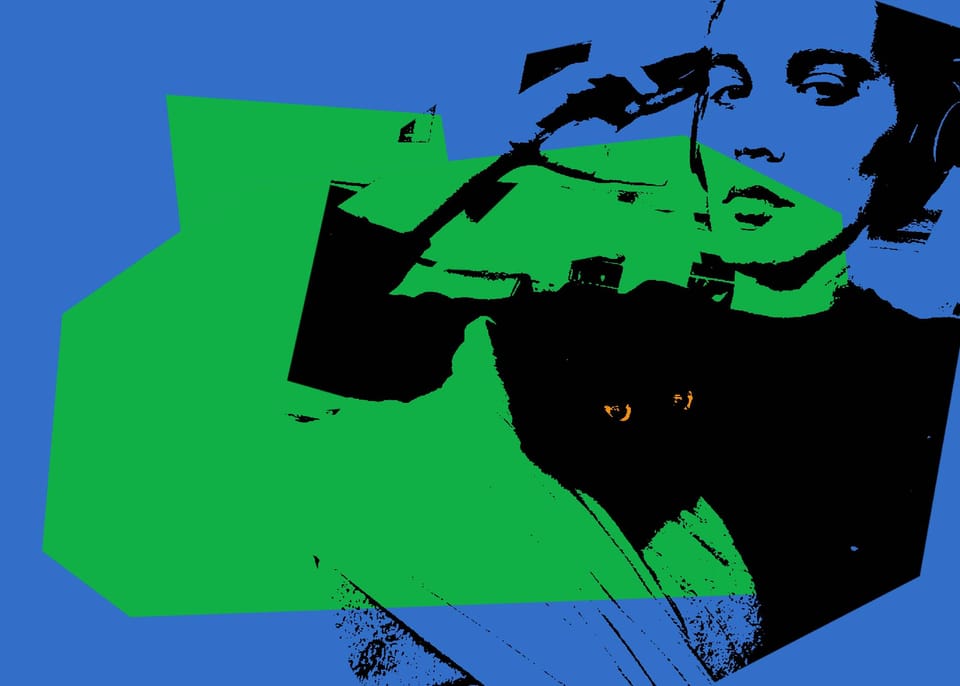Meet Your Obituarist

A short interview with Sahar Tavakoli.
Sahar writes the crosswords and the obituaries for The Stopgap and is a gem of the world. I recently attended one of her dissertation meetings and it was about organized prosciutto crime! I could never find enough words to say all the good things about her so instead here's an interview.
—Jo
What is your name, as far as you feel comfortable sharing it—you could have a pseudonym like many crossword setters!—and where are you from?
My name is Sahar Tavakoli and I’m from—oh man, OK, so my associated paperwork says that I’m Iranian and Australian. Most of the time I live in Milan, though I’ve spent the last 10 months in Ithaca. Upstate New York Ithaca, not Greek island Ithaca.
What is the first crossword you remember doing?
A ‘transportation’ themed crossword in second grade (year two in actor’s categories). 2S, Miss Sachinwalla’s class. I remember it coming with a companion ‘community’ themed find-a-word, though I can’t recall if they were both on the same worksheet or on two separate sheets.
How did you learn to do cryptic crosswords? I learned from a book and then a teacher at school and then I practised a lot. I had to kind of fake being able to do them for a long time while looking up the answers.
Well, speaking of faking ability, I don’t actually know how to do a cryptic crossword. Or, like, I know how they’re done, I just can’t do them myself. I’ll do others, though! I prefer a hanging letter, otherwise it feels like the downs are done before you’ve finished the acrosses, and it’s nice when the clues are a little riddly at least.
Synonym crosswords drive me bananas. The New York Times Saturday is ok, though kind of formulaic, I like The Times. The New Yorker is fiiiine as long as it’s one of the ‘challenging’ ones, otherwise we’re back at synonyms. Anyway, you didn’t ask me to rank crosswords, you asked how I learned to do cryptics.
You know, I was dreading this question: I feel like Elmer Fudd telling Bugs and Daffy that he’s a vegetarian. I don’t do cwyptics, I just wite them for sport. Huh-uh-uh-uh-uh.
What do you work on in regular life and do you think it relates to cryptic crosswords somehow? Or is it the reverse, as in an escape?
I’m a PhD student, soon a PhD graduate, insha’Allah in an interdisciplinary field called Science and Technology Studies. I’m on the sociological end of things, working on processes related to food standardisation and their participation in the stabilising of nation and national identity. Basically, I ask things like “is this cheese chauvinistic?” The answer is almost always yes. The exception is Cheddar.
Writing crosswords is a pleasure. Is that the same as an escape? I could be awful here and say something like crossword writing is a pleasure in the sense that it’s a cultivated practice that involves an articulation of ways of thinking both about myself and others (Foucault, 1984). I guess I’m still working on my escape.
Before graduate school I was a microbiologist, which I bring up only so that I can tell my favourite joke: I used to be a microbiologist, now I’m regular size.
What’s your favourite type of clue? Everybody loves an anagram but I do love a chemical symbol or measure.
To write? I like a double definition clue and a bilingual pun. This might sound a bit funny considering the fact that we’re talking cryptics but I like a clue with an unambiguous answer. I want the puzzler to arrive at an “a ha!” not an “uh?” The former just seems more satisfying.
How did you learn to make cryptic crosswords—DIY or did somebody teach you?
DIY, though I’m still learning. I had a look at my first crossword somewhat recently and my neck and shoulders are still tense from the experience.
What, to you, makes cryptic crosswords beautiful?
I often find myself finishing sentences with “does that make sense?” or the more insistent “I’m not making sense.” What’s so lovely about a cryptic is that you’re handing over your own jumbled way of thinking about things and somewhere, some puzzler is going “oh yeah, of course. That makes sense”. Being able to do a cryptic isn’t just a demonstration of fluid intelligence but of generosity and empathy: you’ve made sense of some puzzler you might not even know. You’ve understood a stranger and that’s so beautiful. Am I making sense? I don’t think I’m making any sense.
How does it make you feel that there are people out there who faithfully await your special crosswords and solve them joyfully?
It makes me stutter. It’s like corn: I can take the information in but I’m not able to absorb it.
You’re a major part of The Stopgap and for that we thank you. What’s your experience with blogs been?
Thank you for having me!
Beyond The Stopgap, my experience has been as a reader. I used to read this little thing called The Toast per esempio. I feel like I’m veering into Fudd territory again. My experience is no experience, but I’m having a lot of fun gaining it.
The Stopgap has published some on Israel’s war on Palestine. The media is in a very weird spot right now, where coming out against indiscriminate large-scale killing is rather a career-ender. You put together our translation project on Refaat Alareer’s poem, with kite-making instructions. You also write the obituaries for The Stopgap, and in them you’ve mentioned grief, watching the news helplessly, and your dad remembering Sabra and Shatila. Your crosswords also frequently betray your interest in geopolitics and history. Talk to me about how your politics and your crossword/obituary practice work together?
I have so many things I want to say here and no idea how to say any of them. Can I use this moment to note how impressive your pieces on Palestine, on Lebanon, and on news words have been? What’s a way of saying ‘touching’ and ‘powerful’ without it coming across as trite?
Traditionally an obit is a notice of death paired with a short biography. The standard is to go name, date of death, date of birth, greatest achievement, surviving kith and kin. More often, though, they read like memoranda. I felt that if that’s going to be the case then we shouldn’t just be talking about lives recently lost, but those lost decades or centuries ago. One’s presence in the world doesn’t disappear when they die, and those who remain live in worlds that are different for the people they’ve lost. We don’t really know what someone meant to the ways in which we live until we’ve had to do that living without them. And at that point, you start thinking about other departures—objects that have ‘died,’ or animals, fictional characters, seasons, so on.
This is all getting away from the question you asked. I’m going to keep drifting off but hopefully I’m on a current that’ll circle back around. You mention my dad remembering Sabra and Shatila. He taught me about the massacre when I was around 13 or 14, on a car ride to school. The same period and place in which he told me about the plastic Keys to Paradise distributed in the Iran-Iraq war, the time he got out of a speeding ticket by pretending to be an agent of SAVAK, going to Baghdad as a child and seeing his first ever Coca-Cola, and the US bombing of a shelter in Amiriyah. Some things were not of his lifetime: the Ottoman-led march of Armenians into the Syrian Desert, the Russo-Persian wars and how his grandmother hid a Russian defector in a tanoor. All of it was presented as equivalent in geopolitical significance, and all of it was put forward as having presence in the present. It really did and it does.
That’s part of what I wanted to do with the obituaries—to recognise that death persists after death and becomes folded into life. Similar with crossword clues; to show that things that one might not have intuitively thought of as connected are actually very much connected. But then the US-backed state of Israel began a somehow even more horrific phase in a ¾ century long war on Palestine—its people, the land, its animals, its characters, its seasons, its past, and its future, and the project of writing obits began to feel icky. I’ll admit, it’s been more and more difficult to write them. It’s generous of you to say that my politics and my practice work together and I’m grateful. I feel I’ve done an inadequate job of expressing my rage and my grief, but I also wouldn’t know what could count as adequate in a genocide.


Comments ()